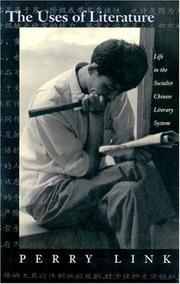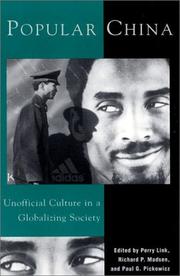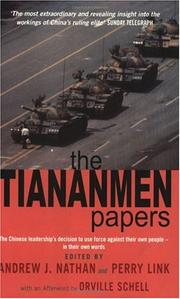| Listing 1 - 10 of 10 |
Sort by
|

ISBN: 0691001987 0691227845 Year: 2000 Publisher: Princeton (N.J.): Princeton university press
Abstract | Keywords | Export | Availability | Bookmark
 Loading...
Loading...Choose an application
- Reference Manager
- EndNote
- RefWorks (Direct export to RefWorks)
Why do people in socialist China read and write literary works? Earlier studies in Western Sinology have approached Chinese texts from the socialist era as portraits of society, as keys to the tug-of-war of dissent, or, more recently, as pursuit of "pure art." The Uses of Literature looks broadly and empirically at these and many other "uses" of literature from the points of view of authors, editors, political authorities, and several kinds of readers. Perry Link, author of Evening Chats in Beijing, considers texts ranging from elite "misty" poetry to underground hand-copied volumes (shouchauben) and shows in concrete detail how people who were involved with literature sought to teach, learn, enjoy, explore, debate, lead, control, and resist. Using the late 1970s and early 1980s as an entree to the workings of China's "socialist literary system," the author shows how that system held sway from 1950 until around 1990, when an encroaching market economy gradually but fundamentally changed it. In addition to providing a definitive overview of how the socialist Chinese literary system worked, Link offers comparisons to the similar system in the Soviet Union. In the final chapter, the book seeks to explain how the word "good" was used and understood when applied to literary works in such systems. Combining aspects of cultural and literary studies, The Uses of Literature will reward anyone interested in the literature of modern China or how creativity is affected by a "socialist literary system."
S16/0170 --- S16/0195 --- S06/0436 --- China: Literature and theatrical art--General works on modern literature --- China: Literature and theatrical art--Thematic studies --- China: Politics and government--Policy towards literature and art --- Chinese literature --- 20th century --- History and criticism --- Socialism and literature --- China --- Literature and society --- LITERARY CRITICISM / Asian / Chinese --- Litterature et societe --- Socialisme et litterature --- Litterature chinoise --- Chinesisch --- Politik --- Gesellschaft --- Literatur --- Sozialismus --- Socialism and literature. --- Literature and society. --- Chinese literature. --- Histoire et critique. --- History and criticism. --- China. --- Chinesisch. --- Akhmatova, Anna. --- Alyoshin, Samuil. --- Anhui province. --- Bai Hua. --- Bai Xianyong. --- Bell Tower Society. --- Bureau of Drama Reform. --- Cao Guanlong. --- Cao Xueqin. --- Chen Guokai. --- Chinese Academy of Sciences. --- Chinese Progress (journal). --- Christianity. --- Confucius. --- Dai minority people. --- Democracy Wall. --- Ehrenburg, Ilya. --- Fadeyev, Alexander. --- Feng Menglong. --- Gao Xiaosheng. --- Guo Moruo. --- Han Shaogong. --- Heavy Wings (Zhang Jie). --- Hiroshima. --- Hu Yaobang. --- Jiang Zilong. --- Jin Jingmai. --- Khrushchev Remembers. --- Khrushchev, Nikita. --- Kong Jiesheng. --- Li Yingru. --- Mao Zedong. --- Marxism-Leninism. --- May Fourth movement. --- Napoleon. --- Paustovsky, Konstantin. --- alienation. --- bookstores. --- bureaucratism. --- calligraphy. --- cartoonists. --- conservatives. --- corruption. --- decadence. --- democracy. --- engineering, literary. --- existentialism. --- feudalism. --- filmscripts. --- liberalism. --- neorealism. --- pluralism. --- Literature and socialism --- Literature --- Literature and sociology --- Society and literature --- Sociology and literature --- Sociolinguistics --- Social aspects --- Cina --- Kinë --- Cathay --- Chinese National Government --- Chung-kuo kuo min cheng fu --- Republic of China (1912-1949) --- Kuo min cheng fu (China : 1912-1949) --- Chung-hua min kuo (1912-1949) --- Kina (China) --- National Government (1912-1949) --- China (Republic : 1912-1949) --- People's Republic of China --- Chinese People's Republic --- Chung-hua jen min kung ho kuo --- Central People's Government of Communist China --- Chung yang jen min cheng fu --- Chung-hua chung yang jen min kung ho kuo --- Central Government of the People's Republic of China --- Zhonghua Renmin Gongheguo --- Zhong hua ren min gong he guo --- Kitaĭskai︠a︡ Narodnai︠a︡ Respublika --- Činská lidová republika --- RRT --- Republik Rakjat Tiongkok --- KNR --- Kytaĭsʹka Narodna Respublika --- Jumhūriyat al-Ṣīn al-Shaʻbīyah --- RRC --- Kitaĭ --- Kínai Népköztársaság --- Chūka Jinmin Kyōwakoku --- Erets Sin --- Sin --- Sāthāranarat Prachāchon Čhīn --- P.R. China --- PR China --- PRC --- P.R.C. --- Chung-kuo --- Zhongguo --- Zhonghuaminguo (1912-1949) --- Zhong guo --- Chine --- République Populaire de Chine --- República Popular China --- Catay --- VR China --- VRChina --- 中國 --- 中国 --- 中华人民共和国 --- Jhongguó --- Bu̇gu̇de Nayiramdaxu Dundadu Arad Ulus --- Bu̇gu̇de Nayiramdaqu Dumdadu Arad Ulus --- Bu̇gd Naĭramdakh Dundad Ard Uls --- BNKhAU --- БНХАУ --- Khi︠a︡tad --- Kitad --- Dumdadu Ulus --- Dumdad Uls --- Думдад Улс --- Kitajska --- China (Republic : 1949- ) --- Sozialistisches Gesellschaftssystem --- Gesellschaftsordnung --- Kommunismus --- Sozialistische Bewegung --- Sozialist --- Belletristik --- Dichtung --- Schöne Literatur --- Sprachkunst --- Wortkunst --- Buch --- Schriftsteller --- Sein --- Staatspolitik --- Politische Lage --- Politische Entwicklung --- Politische Situation --- Guoyu --- Kuo-yü --- Putonghua --- P'u-t'ung-hua --- Mandarin --- Guanhua --- Kuanhua --- Nationalsprache --- Sinotibetische Sprachen --- Littérature et socialisme --- Communisme et littérature --- Marxisme et littérature --- Politique et littérature --- Socialisme et culture --- Littérature --- Société et littérature --- Femmes et littérature --- Littérature et géographie --- Littérature postcoloniale --- Sociologie de la littérature --- Vie littéraire --- Féminisme et littérature --- Institution littéraire --- Psychologie sociale et littérature --- Aspect social --- 1949 --- -BNKhAU --- Chung-hua min kuo --- Jhonggu --- Khi͡atad --- Kin --- Kita --- Kitaĭskai͡a Narodnai͡a Respublika --- National Government --- Republic --- Republic of China --- Zhonghuaminguo --- Rotchina --- Zhongguo-Diguo --- Kaiserreich Zhongguo --- Zhonghua-minguo --- Chung-hua-min-kuo --- Zhonghua-Renmin-Gongheguo --- Kaiserreich China --- Shinkoku --- Chung-hua-jen-min-kung-ho-kuo --- Zhonghua --- Volksrepublik China --- Zhonghua renmin gongheguo --- République populaire de Chine --- Kytajsʹkaja Narodnaja Respublika --- Chinese People’s Republic --- Chinesen --- Taiwan
Book
ISBN: 9780674066021 Year: 2013 Publisher: Cambridge Harvard university press
Abstract | Keywords | Export | Availability | Bookmark
 Loading...
Loading...Choose an application
- Reference Manager
- EndNote
- RefWorks (Direct export to RefWorks)
S15/0200 --- China: Language--General works --- Chinese language --- Rhythm. --- Metaphors. --- Semantics. --- Political aspects. --- Sino-Tibetan languages --- Metaphors --- Political aspects --- Rhythm --- Semantics
Book
ISBN: 0520041119 Year: 1981 Publisher: Berkeley University of California press
Abstract | Keywords | Export | Availability | Bookmark
 Loading...
Loading...Choose an application
- Reference Manager
- EndNote
- RefWorks (Direct export to RefWorks)

ISBN: 0742510794 Year: 2002 Publisher: Totowa Rowman & Littlefield
Abstract | Keywords | Export | Availability | Bookmark
 Loading...
Loading...Choose an application
- Reference Manager
- EndNote
- RefWorks (Direct export to RefWorks)
S02/0200 --- S11/0920 --- S11/0730 --- S11/0731 --- S11/0900 --- S11/1080 --- S10/0330 --- S11/0816 --- S11/0745 --- China: General works--Civilization and culture --- China: Social sciences--Corruption --- China: Social sciences--Women: since 1949 --- China: Social sciences--Childhood, youth --- China: Social sciences--Social pathology, social deviance (incl. infanticide, abandoned children, hoodlums) --- China: Social sciences--Migration inside China --- China: Economics, industry and commerce--Employment --- China: Social sciences--Criminality --- China: Social sciences--Sexual life: since 1949 --- Popular culture
Book
ISBN: 0674071158 0674067681 9780674067684 9780674066021 0674066022 9780674071155 Year: 2013 Publisher: Cambridge, MA
Abstract | Keywords | Export | Availability | Bookmark
 Loading...
Loading...Choose an application
- Reference Manager
- EndNote
- RefWorks (Direct export to RefWorks)
During the Cultural Revolution, Mao exhorted the Chinese people to "smash the four olds": old customs, old culture, old habits, and old ideas. Yet when the Red Guards in Tiananmen Square chanted "We want to see Chairman Mao," they unknowingly used a classical rhythm that dates back to the Han period and is the very embodiment of the four olds. An Anatomy of Chinese reveals how rhythms, conceptual metaphors, and political language convey time-honored meanings of which Chinese speakers themselves may not be consciously aware, and contributes to the ongoing debate over whether language shapes thought, or vice versa. Perry Link's inquiry into the workings of Chinese reveals convergences and divergences with English, most strikingly in the area of conceptual metaphor. Different spatial metaphors for consciousness, for instance, mean that English speakers wake up while speakers of Chinese wake across. Other underlying metaphors in the two languages are similar, lending support to theories that locate the origins of language in the brain. The distinction between daily-life language and official language has been unusually significant in contemporary China, and Link explores how ordinary citizens learn to play language games, artfully wielding officialese to advance their interests or defend themselves from others. Particularly provocative is Link's consideration of how Indo-European languages, with their preference for abstract nouns, generate philosophical puzzles that Chinese, with its preference for verbs, avoids. The mind-body problem that has plagued Western culture may be fundamentally less problematic for speakers of Chinese.
Chinese language --- Sino-Tibetan languages --- Rhythm. --- Metaphors. --- Semantics. --- Political aspects.
Book
ISBN: 0856341681 Year: 1983 Publisher: London : Blond and Briggs,
Abstract | Keywords | Export | Availability | Bookmark
 Loading...
Loading...Choose an application
- Reference Manager
- EndNote
- RefWorks (Direct export to RefWorks)
Book
ISBN: 0253051800 Year: 1983 Publisher: Indiana University Press
Abstract | Keywords | Export | Availability | Bookmark
 Loading...
Loading...Choose an application
- Reference Manager
- EndNote
- RefWorks (Direct export to RefWorks)
The literature of the People's Republic of China became livelier and more varied during the "thaw" of 1979-80 than at any other time since the revolution. Perry Link, who lived in China during that period, has assembled the most representative examples, as well as those of most interest to Western readers, of "stubborn weeds"—the writing that would not die in spite of the pressures of the Cultural Revolution. The volume indicates fiction, drama, poetry, and such popular performing arts as comedians' dialogues and clappertales. The writers range from the prize-winning JiangZilong, to the controversial Bai Hua, to university students who wrote under pseudonymns in unofficial publications. In addition to exposing the injustices of the Cultural Revolution, the writers touch on previously heretical topics such as homosexuality, poverty, and the corruption of the regime. Perry Link's informative introductions trace the byzantine twists and turns in contemporary China and place them in a societal context. Because of its rich reflection of Chinese realities, Stubborn Weeds will interest sociologists and political scientists as well as literary scholars and general readers, who will welcome these authentic views.
Chinese literature. --- Chinese literature --- Translations into English. --- Anthologies: general
Book
ISBN: 9025417116 Year: 2001 Publisher: Amsterdam Contact
Abstract | Keywords | Export | Availability | Bookmark
 Loading...
Loading...Choose an application
- Reference Manager
- EndNote
- RefWorks (Direct export to RefWorks)
S06/0500 --- S06/0423 --- S04/0922 --- #SML: Chinese memorial library --- 951.093 --- China: Politics and government--Other modern political movements (e.g. anarchism, Socialism, dissident movements, Beijing Spring, Tian'anmen) --- China: Politics and government--CCP: 1976 - 1989 --- China: History--PRC: 1976 - 1989 --- Geschiedenis van China: Chinese volksrepubliek (1949- ) --- 951.093 Geschiedenis van China: Chinese volksrepubliek (1949- )
Book
ISBN: 0674071948 0674063112 9780674063112 9780674061477 0674061470 9780674071940 0674072324 Year: 2012 Publisher: Cambridge, Mass. Belknap Press of Harvard University Press
Abstract | Keywords | Export | Availability | Bookmark
 Loading...
Loading...Choose an application
- Reference Manager
- EndNote
- RefWorks (Direct export to RefWorks)
When the Nobel Peace Prize was awarded on December 10, 2010, its recipient, Liu Xiaobo, was in Jinzhou Prison, serving an eleven-year sentence for what Beijing called "incitement to subvert state power." In Oslo, actress Liv Ullmann read a long statement the activist had prepared for his 2009 trial. It read in part: "I stand by the convictions I expressed in my 'June Second Hunger Strike Declaration' twenty years ago-I have no enemies and no hatred. None of the police who monitored, arrested, and interrogated me, none of the prosecutors who indicted me, and none of the judges who judged me are my enemies."That statement is one of the pieces in this book, which includes writings spanning two decades, providing insight into all aspects of Chinese life. These works not only chronicle a leading dissident's struggle against tyranny but enrich the record of universal longing for freedom and dignity. Liu speaks pragmatically, yet with deep-seated passion, about peasant land disputes, the Han Chinese in Tibet, child slavery, the CCP's Olympic strategy, the Internet in China, the contemporary craze for Confucius, and the Tiananmen massacre. Also presented are poems written for his wife, Liu Xia, public documents, and a foreword by Václav Havel.This collection is an aid to reflection for Western readers who might take for granted the values Liu has dedicated his life to achieving for his homeland.
Chinese essays --- Essays --- Chinese poetry --- Chinese literature --- Collected papers (Anthologies) --- Papers, Collected (Anthologies) --- Prose literature --- Festschriften --- S02/0220 --- S16/0470 --- China: General works--Intellectuals: after 1949 --- China: Literature and theatrical art--Modern tales, short stories, prose: texts and translations

ISBN: 0349114692 Year: 2001 Publisher: London : Abacus,
Abstract | Keywords | Export | Availability | Bookmark
 Loading...
Loading...Choose an application
- Reference Manager
- EndNote
- RefWorks (Direct export to RefWorks)
| Listing 1 - 10 of 10 |
Sort by
|

 Search
Search Feedback
Feedback About UniCat
About UniCat  Help
Help News
News